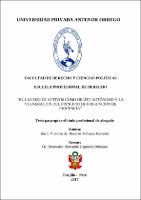Mostrar el registro sencillo del ítem
El lavado de activos como delito autónomo y la vulneracion del principio de presunción de inocencia
| dc.contributor.advisor | Espinola Otiniano, Diomedes Hernando | |
| dc.contributor.author | Tuñoque Ramirez, Victoria del Rosario | |
| dc.creator | Tuñoque Ramirez, Victoria del Rosario | |
| dc.date.accessioned | 2017-11-22T13:47:22Z | |
| dc.date.available | 2017-11-22T13:47:22Z | |
| dc.date.issued | 2017 | |
| dc.identifier.uri | https://hdl.handle.net/20.500.12759/3309 | |
| dc.description.abstract | En la presente investigación, tenemos por objetivo principal determinar como el Decreto Legislativo. N° 1106, que modifica la autonomía del delito de Lavado de Activos afecta el principio de presunción de inocencia. Siendo así, se partirá teniendo en consideración la importancia mundial que se le da a la prevención y control de este delito, por lo que diferentes países y organizaciones buscan crear un modelo adecuado y efectivo. Ya delimitada la importancia, debemos traer al plano nacional esta figura delictiva y como está siendo tratada por la política criminal peruana, partiendo del sentido de la tipificación nacional, la misma que le da la calidad de autónomo, deteniéndonos aquí, ya que este es un punto controvertido en el sentido que los jueces y grandes doctrinarios aún no se ponen de acuerdo respecto al delito previo, por lo que existen dos teorías fundamentales, la primera es la acogida por nuestra normatividad que la de la autonomía a este delito, y la segunda hace referencia a que se necesita del delito previo (conocer, vincular, determinar) para que se inicie - sin ninguna vulneración de principios procesales y constitucionales - el proceso por lavado de activos. Por lo que, luego de realizar esta investigación concluimos que, la teoría acogida en nuestra legislación vulnera efectivamente principios constitucionales y procesales, como es el de presunción de inocencia. | es_PE |
| dc.description.abstract | In the present investigation, our main objective is to determine how the Legislative Decree. No. 1106, which modifies the autonomy of the crime of money laundering affects the principle of presumption of innocence. In this way, it will be divided taking into consideration the global importance that is given to the prevention and control of this crime, so that different countries and organizations seek to create an adequate and effective model. Once the importance has been delimited, we must bring to the national level this criminal figure and as it is being treated by the Peruvian criminal policy, starting from the sense of the national typification, the same one that gives the quality of autonomous, stopping us here, since this is a controversial point in the sense that the judges and great doctrinaires still do not agree on the previous offense, so that there are two fundamental theories, the first is the acceptance by our normativity that the one of the autonomy to this crime, and the second refers to the need to know (to know, to link, to determine) to initiate - without any violation of procedural and constitutional principles - the process of money laundering. Therefore, after conducting this research, we conclude that the theory accepted in our legislation effectively violates constitutional and procedural principles, such as presumption of innocence. | en_US |
| dc.description.uri | Tesis | es_PE |
| dc.format | application/pdf | es_PE |
| dc.language.iso | spa | es_PE |
| dc.publisher | Universidad Privada Antenor Orrego | es_PE |
| dc.relation.ispartofseries | T_DERE_378 | |
| dc.rights | info:eu-repo/semantics/openAccess | es_PE |
| dc.rights.uri | https://creativecommons.org/licenses/by/4.0/ | es_PE |
| dc.source | Universidad Privada Antenor Orrego | es_PE |
| dc.source | Repositorio Institucional - UPAO | es_PE |
| dc.subject | Delito autónomo | es_PE |
| dc.subject | Principio de presunción | es_PE |
| dc.title | El lavado de activos como delito autónomo y la vulneracion del principio de presunción de inocencia | es_PE |
| dc.type | info:eu-repo/semantics/bachelorThesis | es_PE |
| thesis.degree.level | Título Profesional | es_PE |
| thesis.degree.grantor | Universidad Privada Antenor Orrego. Facultad de Derecho y Ciencias Políticas | es_PE |
| thesis.degree.name | Abogado | es_PE |
| thesis.degree.discipline | Derecho | es_PE |
| dc.publisher.country | PE | es_PE |
Ficheros en el ítem
Este ítem aparece en la(s) siguiente(s) colección(es)
-
Derecho [453]


